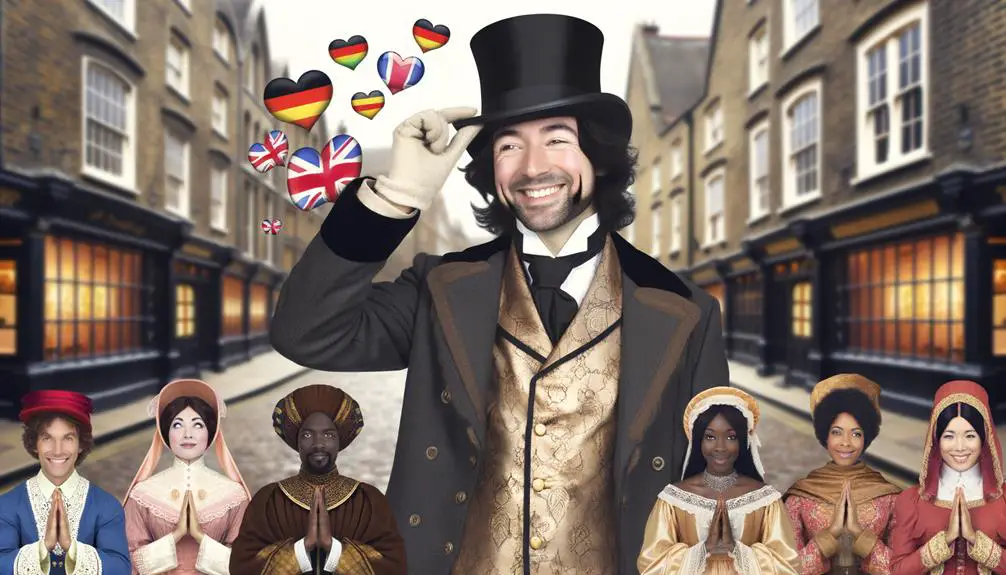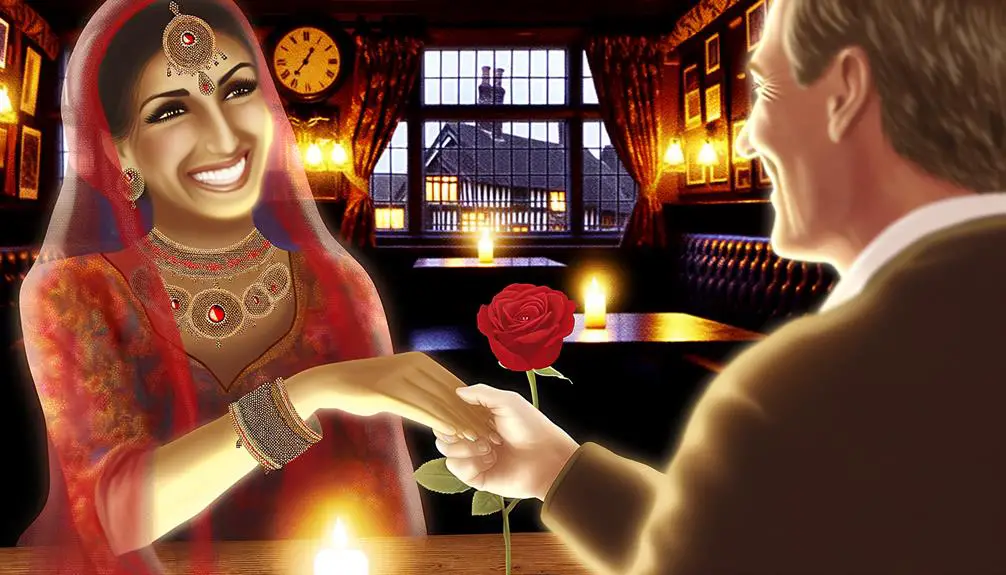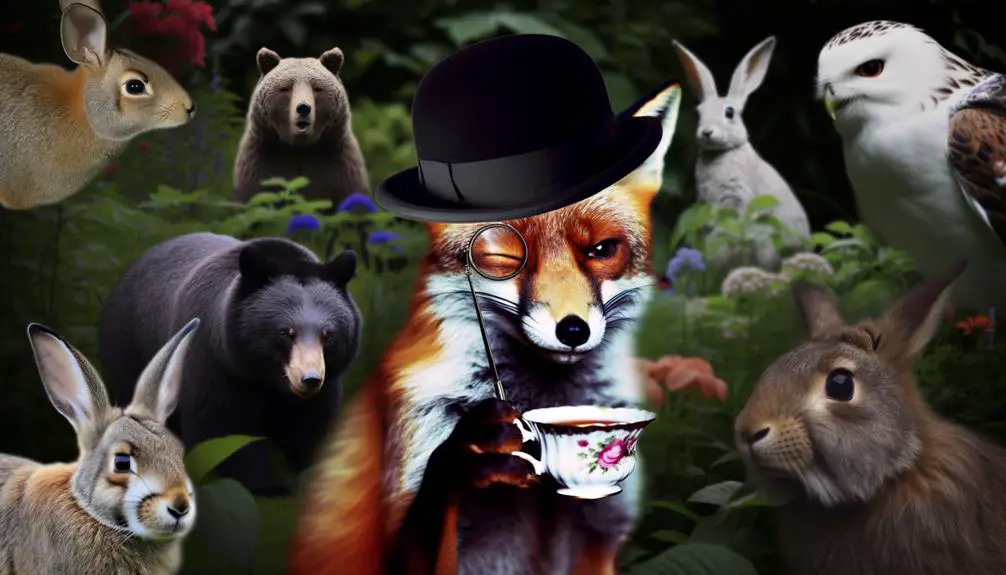In British slang, you'll find the term 'charmer' imbued with a rich history stretching back to its Latin roots, meaning song or verse, and encompassing magical persuasion in medieval times. This term has evolved to describe someone wielding an enchanting personality, capable of enthralling and persuading with ease. Analytically speaking, this duality of charm encompasses both its bewitching appeal and the potential for underlying manipulation. The linguistic journey from spells to modern-day charisma underscores the power of verbal interaction. Genuine charm, differentiated from deceit through sincere compliments, marks true connection. Exploring this dichotomy further reveals the complexities of social interactions and the strategic dance of communication.
Key Takeaways
- In British slang, a 'charmer' refers to someone with an enchanting, captivating personality.
- The term can have both positive connotations of flattering and charming traits and negative implications of manipulation.
- Historically, 'charmer' links to magical spells, highlighting a mystical ability to persuade and captivate.
- In romantic contexts, it denotes flirtatious actions and seductive techniques to allure.
- Regional variations across Britain influence the perception and interpretation of a 'charmer'.
Defining 'Charmer'

In British slang, the term 'charmer' typically refers to an individual who possesses an enticing and enchanting personality, adept at influencing or persuading others through their appeal and charisma. Delving into the charm definition, it is vital to recognize the multifaceted nature of charm as a social tool, embodying both a natural allure and a cultivated skill in personal interactions. This nuanced understanding is pivotal in appreciating the depth and complexity behind the seemingly straightforward label of a 'charmer.'
The evolution of slang, including terms like 'charmer,' reflects broader shifts in societal attitudes and values. As slang evolves, it encapsulates the dynamic interplay between language and culture, offering insights into how charm's perception has transformed over time. Historically, being labeled a 'charmer' might have implied a certain superficiality or deceitfulness in using one's charm for manipulation. However, contemporary interpretations often view charm more positively, valuing it as a genuine social grace and a means of fostering connections.
This shift underscores the importance of context in understanding slang's nuances. Analyzing the term 'charmer' within British slang reveals not just a linguistic evolution but a cultural reevaluation of what it means to wield charm effectively and ethically in social interactions.
Historical Origins
To fully grasp the contemporary significance of the term 'charmer' within British slang, it's necessary to examine its historical origins and the evolution of charm as a concept. The etymological roots of 'charmer' trace back to the Latin word 'carmen,' meaning song or verse, which later evolved in Old French as 'charme,' denoting a way to influence or enchant through words. This linguistic progression underscores the power of language and communication in shaping perceptions and social interactions.
In medieval and early modern Britain, charm held a dual significance. On one hand, it referred to magical spells or enchantments, highlighting a mystical aspect. On the other hand, charm was associated with the art of persuasion and the ability to attract or influence others through personal charisma. This historical duality has left a lasting cultural impact, embedding the notion of a 'charmer' as someone who possesses an almost magical ability to captivate and persuade.
The shift of 'charmer' into British slang encapsulates this blend of enchantment and persuasion, reflecting a nuanced understanding of human interaction. It's this rich tapestry of historical meanings that informs the contemporary usage of 'charmer,' emphasizing the cultural impact of historical linguistic transformations on modern communication.
Positive Connotations

When you explore the positive connotations of the term 'charmer' within British slang, you're primarily engaging with its association to flattering compliments and charming personality traits. These aspects serve not only to embellish the social interactions but also to elevate the perceived charisma and appeal of individuals labeled accordingly. This linguistic nuance underscores the complexity and depth of interpersonal dynamics in British culture, highlighting how language shapes and reflects social perceptions.
Flattering Compliments
Throughout the evolution of British slang, the term 'charmer' has consistently been employed to denote individuals adept at delivering flattering compliments, thereby embodying a nuanced interplay of linguistic skill and social acumen. To understand how charm operates within this context, consider these elements:
- Precision: Charmer's compliment techniques are meticulously tailored, demonstrating an understanding of the recipient's unique attributes or achievements.
- Sincerity: Authenticity in delivering compliments guarantees that the act of receiving flattery feels genuine rather than manipulative.
- Timing: Effective charmers understand the importance of timing in delivering compliments to maximize impact.
- Tact: A charmer's ability to navigate social situations with tact enhances the perceived value of their compliments, making the experience of receiving flattery a memorable one.
Charming Personality Traits
Building on the nuanced understanding of how charmers employ flattering compliments, it's imperative to examine the intrinsic personality traits that render these individuals so effective in their social interactions. Through behavioral analysis, we discern that natural charisma isn't merely about allure but encompasses a spectrum of qualities.
| Trait | Description | Impact on Social Interaction |
|---|---|---|
| Empathy | Understanding and sharing the feelings of others | Fosters deeper connections |
| Confidence | Belief in one's own abilities | Attracts and reassures others |
| Humor | Ability to provoke laughter and provide amusement | Eases tensions and draws people closer |
| Flexibility | Capability to adjust to new conditions | Helps in adapting to various social settings |
These elements, when combined, create a compelling, magnetic personality that is both enchanting and genuine.
Negative Connotations
Despite its seemingly positive facade, the term 'charmer' often harbors negative connotations, suggesting manipulation and deceit beneath a veneer of charm. When you peel back the layers, the allure of a charmer often masks more insidious motives. This duality raises questions about the authenticity of their charm and the ultimate intention behind their engaging demeanor.
Here are four key aspects where the term 'charmer' acquires its negative shades:
- Social Manipulation: Charmers are skilled at maneuvering social situations to their advantage, often employing their charisma to influence others' perceptions and actions, leaving a trail of confusion and sometimes harm in their wake.
- Deceptive Intentions: The underlying motivations of a charmer are not always as benign as they appear. Their engaging personality can serve as a smokescreen for deceit, cloaking ulterior motives that prioritize their interests over the well-being of others.
- Superficial Connections: Relationships fostered by a charmer are frequently shallow, built on the unstable foundation of their self-serving agendas rather than genuine mutual respect and interest.
- Erosion of Trust: The realization of a charmer's true nature can undermine trust, leaving individuals wary of future encounters with seemingly charismatic personalities.
Understanding these negative connotations is important in managing social interactions with a critical, discerning eye.
In Romantic Contexts

In examining the term 'charmer' within romantic contexts, it's imperative you understand the spectrum of intentions behind flirtatious actions. The distinction between genuine compliments and strategic manipulations highlights the complexity of interpreting romantic advances. Consequently, traversing these waters requires a keen insight into the subtleties of communication, discerning between sincere interest and deceptive charm.
Flirtatious Intentions Unveiled
One often finds that the term 'charmer' in British slang reveals a complex interplay of flirtatious intentions, particularly within romantic contexts. This linguistic nuance is deeply rooted in the understanding of seduction techniques and body language analysis, offering a fascinating glimpse into interpersonal dynamics.
- Seduction techniques: Charmers adeptly use persuasive language and emotional intelligence to create a magnetic aura around themselves.
- Body language analysis: They exhibit non-verbal cues such as sustained eye contact, mirroring gestures, and open body postures to signal interest and attraction.
- Verbal fluency: A charmer's articulate and witty conversation often serves as a tool for engaging and alluring potential romantic interests.
- Emotional calibration: They possess the ability to read and respond to the emotional states of others, skillfully maneuvering conversations to deepen connections.
Genuine Compliments or Tricks
While maneuvering through the intricate dynamics of romantic interactions, it's crucial to discern whether a charmer's compliments are genuine expressions of admiration or strategic maneuvers designed to captivate and persuade. This distinction lies at the heart of the sincerity debate, a nuanced examination of social manipulation within the domain of romance. Charismatic individuals often wield their allure as a double-edged sword, blurring the lines between authentic affection and calculated influence. Analyzing the context, frequency, and delivery of these compliments can provide insights into their authenticity. However, the subjective nature of interpretation complicates this endeavor, rendering it a sophisticated, ongoing analysis rather than a definitive conclusion. The challenge becomes not only understanding the charmer's motives but also traversing the complexities of human emotion and interaction.
Navigating Romantic Advances
Mastering romantic advances requires skillfully interpreting subtle cues to distinguish sincere interest from mere flirtation. In the context of British slang, where 'charmer' might denote someone with a smooth approach, negotiating these waters becomes even more complex. Understanding the dynamics at play involves:
- Recognizing the crucial importance in every interaction, ensuring that both parties are comfortable and willing to proceed.
- Emphasizing explicit communication to avoid misunderstandings that could lead to discomfort or misinterpretation.
- Observing body language and verbal cues for genuine interest or reluctance.
- Differentiating between culturally specific flirtation methods and universal signs of attraction.
This analytical approach promotes a respectful and informed understanding of romantic advancements, essential for healthy and mutually satisfying interactions.
Charmer in Pop Culture
Throughout the years, pop culture has consistently depicted the archetype of the 'charmer' as a pivotal figure whose influence and appeal transcend mere personal interactions, shaping narratives and audience perceptions in profound ways. Famous charmers within television, film, and literature often embody a blend of charisma, wit, and a knack for persuasive communication, making them unforgettable and influential characters. Their cultural impact is significant, as these characters often challenge societal norms, pushing the boundaries of conventional behavior and morality, thereby engaging audiences in a more thorough reflection on the nature of charm and its effects on human relationships.
Analyzing the portrayal of charmers in pop culture reveals a complex spectrum of character types, from the lovable rogue to the manipulative villain, each offering insights into societal attitudes towards charm and charisma. These characters, by leveraging their charm, navigate through narratives in ways that highlight their multifaceted personalities, showcasing both the positive and negative aspects of being a charmer. This thorough exploration into the charmer archetype not only entertains but also prompts a critical evaluation of the power dynamics at play in interpersonal relationships, emphasizing the charmer's role as a catalyst for narrative development and thematic exploration.
Regional Variations
The term 'charmer,' when analyzed through the lens of regional variations, reveals a rich tapestry of meanings and implications, deeply rooted in the cultural and linguistic nuances of different areas. This exploration into how 'charmer' is perceived across the UK underscores the extent to which dialectical differences and cultural perceptions shape language.
- In Scotland, the word often carries a more earnest connotation, reflecting a genuine admiration for someone's adeptness in social situations with grace, without necessarily implying deceit or manipulation. It's a recognition of someone's skill in maneuvering social situations with grace.
- In Northern England, 'charmer' might be used with a hint of skepticism, suggesting that while someone might be persuasive or flattering, there's an underlying caution to not be wholly taken in by their charm.
- In London and the South East, the term is frequently imbued with a cosmopolitan flair, often used to describe individuals with a smooth, polished demeanor that's as much about style as it is about substance.
- In Wales, linguistic and cultural traditions influence the term to sometimes resonate with a sense of community and warmth, where being a 'charmer' can also mean having the ability to bring people together, transcending mere individual persuasion.
Charmer Vs. Smooth Talker

Some could argue that while both charmers and smooth talkers excel in the art of persuasion, their methods and motivations often diverge considerably, revealing nuanced subtleties in their approaches to social interaction. A charmer, in the context of British slang, typically employs a blend of warmth, humor, and kindness to endear themselves to others. Their charm effectiveness is not merely a function of what is said, but how it is said; their speech techniques are infused with genuine interest and empathy, making their interactions feel personal and sincere.
In contrast, a smooth talker might rely more heavily on eloquence and a polished exterior to influence or impress. While also persuasive, their technique often hinges on a strategic selection of words and a calculated delivery designed to achieve a specific outcome, be it persuasion, manipulation, or simply leaving a memorable impression. The smooth talker's approach can sometimes lack the authenticity and warmth that characterizes a true charmer, making their effectiveness in social situations a matter of context and audience perception.
Understanding these distinctions sheds light on the complex dynamics of interpersonal communication, highlighting how charm and eloquence intersect and diverge in the art of persuasion.
Usage Among Generations
You'll find that the term 'charmer' undergoes significant transformation across generations, reflecting broader shifts in language and societal values. This evolution is particularly evident when comparing its reception and usage among older cohorts with the modern youth, who often infuse the term with nuanced interpretations and contexts. Such generational vocabulary shifts underscore the dynamic nature of slang and its ability to encapsulate changing attitudes and social norms.
Generational Vocabulary Shifts
As we investigate the generational vocabulary shifts, it's clear that the term 'charmer' has undergone significant evolution in its usage and connotations across different age groups. This linguistic evolution highlights the cultural impact of language as it adapts over time. Here's a closer look at how 'charmer' has shifted:
- Elder Generations: Originally viewed as a compliment, indicating a person with a pleasant and persuasive demeanor.
- Mid-Century Users: Began to adopt a slightly skeptical tone, suggesting someone who is smooth but possibly insincere.
- Late 20th Century: Saw increased ambiguity, where the term could either praise social skills or critique manipulative tendencies.
- Early 21st Century: Usage diversifies further, with context heavily influencing whether the term is positive, negative, or neutral.
Modern Youth Interpretations
Exploring the nuances in modern youth interpretations of 'charmer,' it's evident that this term's meanings are as diverse as the generations themselves. The youth language evolution has substantially influenced how 'charmer' is perceived and used, integrating it into online slang trends that often oscillate between earnest praise and ironic, sometimes skeptical, acknowledgment. You'll find that in digital forums and social media, 'charmer' can denote someone with genuine persuasive eloquence or, conversely, imply superficial charm with an undercurrent of deceit. This dichotomy underscores the complexity of interpreting 'charmer' in contemporary contexts, where its meaning is continuously reshaped by cultural shifts, digital communication norms, and the generational dialogue that molds the language's evolution.
Navigating the Nuances

Understanding the term 'charmer' within British slang involves delving into its layered meanings and contexts, a task that requires careful analysis and appreciation of nuanced cultural references. The linguistic evolution and cultural impact of 'charmer' provide a fascinating lens through which to examine its multifaceted significance. Here are four key considerations to navigate its nuances:
- Linguistic Shifts: The term has undergone significant transformation, reflecting changes in societal attitudes and values. Initially denoting a person with a pleasant manner and persuasive speech, it has evolved to sometimes imply deceit or superficial charm.
- Contextual Sensitivity: The interpretation of 'charmer' heavily depends on context. In casual conversation, it might be affectionate, while in a more formal or critical setting, it could suggest skepticism towards the individual's sincerity.
- Cultural Variations: Regionally within Britain, 'charmer' can carry different connotations. Understanding these regional nuances is essential for grasping the term's full cultural resonance.
- Generational Perspectives: Younger generations might use 'charmer' with a sense of irony or playfulness, diverging from the more traditional or earnest uses.
Grasping these aspects helps one appreciate the complexity of 'charmer' in British slang, highlighting its rich linguistic evolution and cultural depth.










